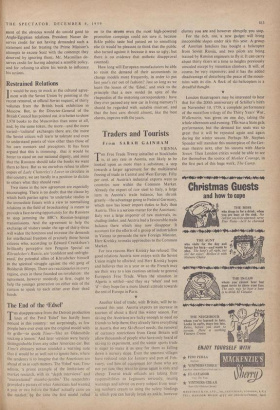Traders and Tourists
From SARAH GA 1NHAM VIENNA THEFree Trade Treaty initialled at Stockholm I is, at any rate in Austria, not likely to be looked upon as more than a substitute, a step towards a larger agreement for the multilateral freeing of trade in Central and West Europe. Fifty per cent. of Austria's industrial exports went to countries now within the Common Market. Already the export of raw steel to Italy, a large item in Austria's trade balance, has shrunk greatly—the advantage going to Federal Germany, which now has lower import duties to Italy than Austria. This is a serious matter for the Austrians : Italy was a large importer of raw materials, in- cluding timber, and Austria had a favourable trade balance there which may now disappear. It accounts for the efforts of a group of industrialists in Vienna to persuade the new Foreign Minister, Herr Kreisky, to make approaches to the Common Market.
For two reasons Herr Kreisky has refused. The good relations Austria now enjoys with the Soviet Union might be affected; and Herr Kreisky hopes and believes that in a year or so the French may see their way to a less cautious attitude to general European Free Trade. When the situation in Algeria is settled--and they say 'when' and not 'if' —they hope for a more liberal attitude towards the rest of Europe in Paris.
* Another kind of trade, with Britain, will be in- creased this year. Austria expects an increase in tourism of about a third this winter season. For ski-ing the Austrians are lucky enough to need no friends to help them; they already have everything in Austria that any Ski-Haserl needs; the removal of currency restrictions from Great Britain will allow thousands of people who have only heard of ski-ing to experiment, and the winter sports trade is eager to make it as easy for them as falling down a nursery slope. Even the smartest villages have reduced rates for January and part of Feb- ruary, and hire of equipment for those who are not yet sure they want to come again is easy and cheap. Tourist trade officials are taking their responsibilities to beginners seriously, issuing warnings and advice on every subject from wear- ing sunburn cream to using the safety bindings in which you can hardly break an ankle, however clumsy you are and however abruptly, you stop.
For the rich, too, a new gadget will bring inaccessible slopes under skis this year. A group of Austrian hoteliers has bought a helicopter from Soviet Russia, and two pilots are being trained by Russian engineers to fly it. It can carry about thirty skiers at a time to heights previously unsealed except by mountain climbers. It will, of course, be very expensive; and it has the added disadvantage of disturbing the peace of the moun- tains with its din. A flock of ski-helicopters is a dreadful thought.
London theatregoers may be interested to hear that for the 200th anniversary of Schiller's birth on November 10, 1759, a complete performance of the marathon trilogy of the Thirty Years' War, Wallenstein, was given on one day, taking the whole afternoon and evening. TI s was a State gala performance, but the demand for seats was so great that it will be repeated again and again during the winter season. Perhaps Mr. Stephen Spender will translate this masterpiece of the-Ger- man theatre next, after his success with Maria Stuart. Then London critics would be able to see for themselves the source of Mother Courage, in the first part of this huge work, The Camp.














































 Previous page
Previous page